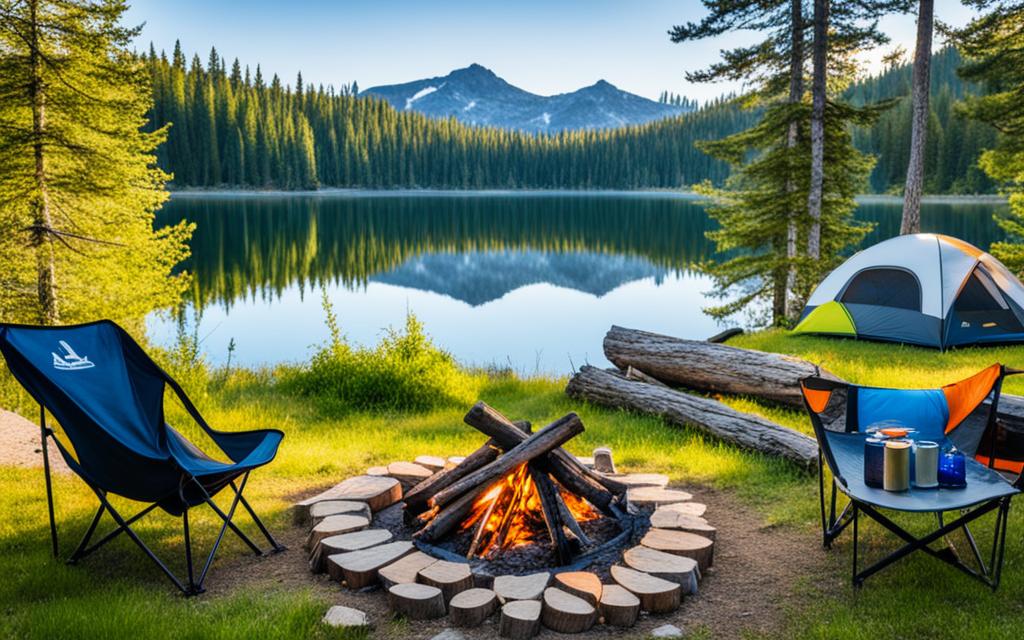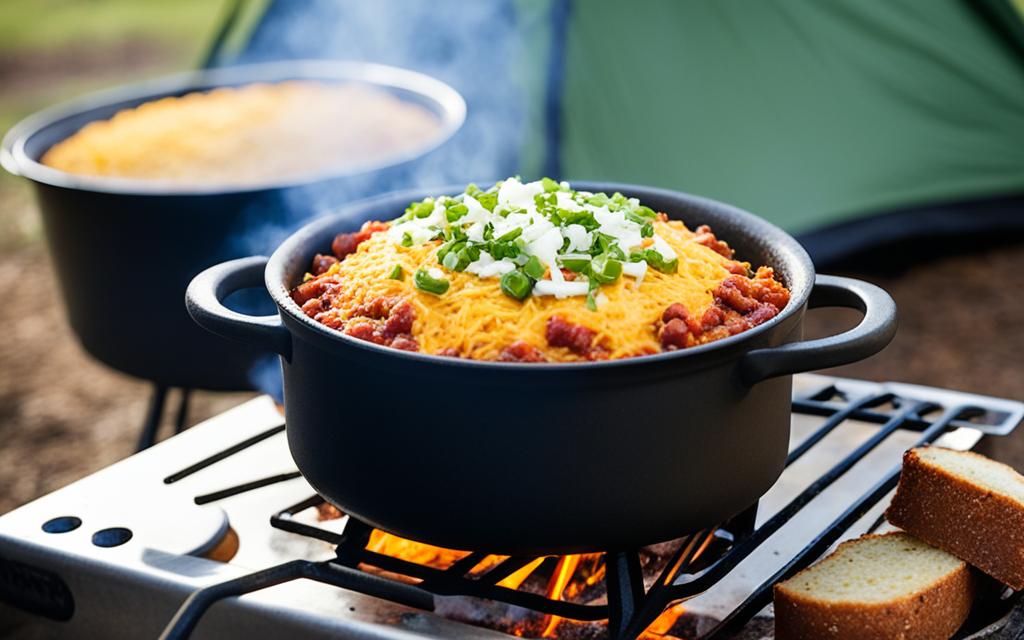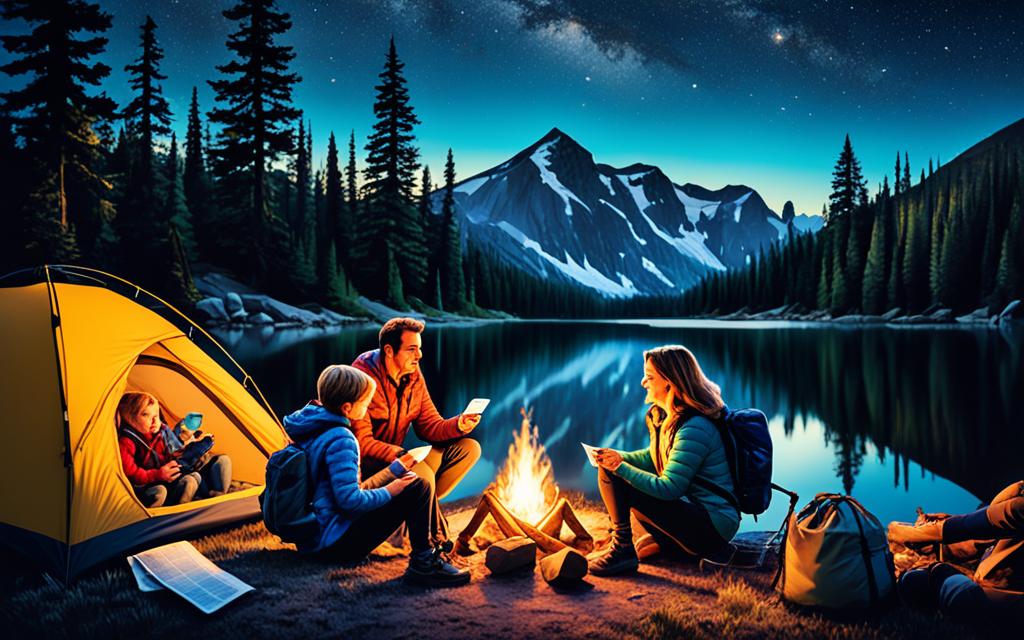Are you ready to embark on an exciting camping adventure? Whether you’re a seasoned outdoor enthusiast or a newbie looking to explore the wilderness, it’s important to be well-prepared for your camping trip. In this section, we will share essential camping tips and tricks that will enhance your outdoor experience.
From the best camping hacks to important outdoor safety tips, we’ve got you covered. Discover insider knowledge that will help you make the most of your time in nature and ensure a memorable camping experience. So, lace up your hiking boots, gather your camping gear, and get ready to embrace the great outdoors!
Key Takeaways:
- Learn valuable camping hacks to simplify your outdoor experience.
- Stay safe with essential outdoor safety tips.
- Maximize your camping adventure by being well-prepared.
- Experience the beauty of nature while enjoying delicious camping food.
- Gain confidence as a beginner camper with our beginner camping guide.
Camping Gear Recommendations
When it comes to camping, having the right gear can make all the difference in ensuring a comfortable and enjoyable experience. Whether you’re a seasoned camper or a beginner, our expert recommendations on essential camping gear will help you make informed decisions. From tents to cooking equipment, we’ve got you covered with our camping essentials checklist and camping tent buying guide.
Camping Essentials Checklist
Before embarking on your camping adventure, it’s crucial to have a thorough camping essentials checklist to ensure you don’t forget anything important. Here are some items that should be on your checklist:
- Tent: A sturdy, waterproof tent is a must-have for any camping trip. Consider the size, durability, and ease of setup when choosing the right tent for your needs.
- Sleeping Bag: Keep yourself cozy and warm during the night with a high-quality sleeping bag suitable for the weather conditions you’ll be camping in.
- Sleeping Pad: A comfortable sleeping pad is essential for providing insulation and cushioning, ensuring a good night’s sleep.
- Camp Stove: Prepare delicious meals in the great outdoors with a reliable camp stove. Look for one that is portable, easy to use, and fuel-efficient.
- Cooking Utensils: Don’t forget to pack essential cooking utensils such as pots, pans, cutlery, and plates to make meal preparation a breeze.
- Lantern or Flashlight: Illuminate your campsite at night with a lantern or flashlight for safety and convenience.
- Cooler: Keep your food and beverages fresh with a durable cooler that can withstand the outdoor elements.
- Camping Chairs: Relax and unwind in comfort with portable and lightweight camping chairs.
- Hiking Boots: Invest in a good pair of hiking boots that provide support, traction, and protection during outdoor activities.
Remember to customize your camping gear based on the specific activities and environment of your trip. The camping essentials checklist above serves as a general guide, but you may need to add or remove items based on your preferences and the duration of your camping trip.
Camping Tent Buying Guide
Choosing the right camping tent is essential for a comfortable and secure camping experience. Here are some factors to consider when buying a camping tent:
- Tent Size: Determine the number of people who will be using the tent and select a size that offers enough space for everyone to sleep comfortably.
- Weather Resistance: Look for a tent with a waterproof rainfly and a sturdy frame that can withstand various weather conditions.
- Setup and Packability: Consider the ease of setup and packability of the tent, especially if you’ll be moving campsites frequently.
- Ventilation: Ensure the tent has proper ventilation to prevent condensation and keep the interior fresh and comfortable.
- Durability: Opt for a tent made of high-quality materials that can withstand wear and tear, providing long-lasting use.
By considering these factors and referring to customer reviews and expert recommendations, you can find a camping tent that meets your specific needs.
With our camping gear recommendations, camping essentials checklist, and camping tent buying guide, you’ll be well-equipped for your next outdoor adventure. Stay tuned for the remaining sections of our camping guide, where we’ll share valuable tips on campsite setup, camping food ideas, beginner camping advice, and outdoor safety tips.
Campsite Setup Tips
Setting up your campsite properly is crucial for a comfortable camping experience. A well-organized and thoughtfully arranged campsite not only maximizes your space but also ensures safety and creates a cozy environment for you to relax and enjoy the great outdoors.

Maximize Your Space
- Choose a flat and level ground to pitch your tent. This will provide stability and prevent any uncomfortable slopes during sleep.
- Utilize camping gear with multiple purposes, such as a camping stove that can also serve as a table or storage containers that can be used as seats.
- Organize your camping gear by using storage containers or hanging organizers. This will not only save space but also make it easier to find your belongings.
Ensure Safety
- Keep your campsite clean and free from food debris to avoid attracting unwanted wildlife.
- Place your tent at a safe distance from campfire areas to prevent accidental fire hazards.
- Secure your tent with heavy-duty stakes and guy lines to withstand strong winds and keep it stable.
Create a Cozy Environment
A properly set up campsite creates a home away from home, allowing you to relax and fully immerse yourself in the camping experience.
- Add cozy touches to your campsite by bringing comfortable camping chairs, soft blankets, and ambient lighting.
- Create a designated cooking area and set up a shelter for protection from the elements.
- Hang hammocks or set up a shaded area for relaxation during the day.
By following these campsite setup tips, you can optimize your camping experience and create a welcoming space that allows you to fully enjoy the beauty of nature.
Camping Food Ideas
No camping trip is complete without delicious food. Whether you’re cooking over a campfire or using a portable stove, camping food can be fun and satisfying. Here are some camping food ideas to inspire your outdoor meals:
1. Easy Campfire Recipes
There’s something special about cooking meals over an open flame. Try these simple campfire recipes that require minimal ingredients and equipment:
- Sausage and Veggie Foil Packets: Wrap sliced sausage, potatoes, bell peppers, and onions in foil. Cook over the fire until the veggies are tender and the sausage is cooked through.
- Grilled Cheese Sandwiches: Make traditional or gourmet grilled cheese sandwiches using a campfire grill grate or a cast iron pan.
- Hot Dogs and S’mores: Classic camping favorites! Roast hot dogs on sticks and enjoy gooey s’mores for dessert.
2. Meal Planning Tips
Meal planning is key to a successful camping trip. Consider these tips to make your camping meals easier and more enjoyable:
- Prep Ingredients at Home: Chop vegetables, marinate meats, and pre-cook rice or pasta before your trip to save time and effort at the campsite.
- Opt for One-Pot Meals: Simplify your cooking process by preparing meals that can be cooked in a single pot or skillet. Think soups, stews, and stir-fries.
- Pack Non-Perishable Foods: Bring along canned goods, dried fruits, nuts, and other non-perishable snacks to supplement your meals.
3. Campsite Breakfast Ideas
Start your camping mornings right with these delicious breakfast ideas:
- Campfire Pancakes: Prepare pancake batter at home and cook fluffy pancakes over the campfire. Serve with syrup, fresh fruits, or whipped cream.
- Omelettes in a Bag: Crack eggs into a Ziploc bag, add desired ingredients like cheese, vegetables, and meat, seal the bag, and boil it in a pot of water until the eggs are cooked.
- Instant Oatmeal with Toppings: Pack individual instant oatmeal packets and customize them with toppings like berries, nuts, and honey.
4. Snacks and Easy Lunch Options
When you’re on the go, these snacks and lunch ideas are convenient and delicious:
- Trail Mix: Create your own trail mix by combining nuts, dried fruits, pretzels, and chocolate chips. It’s perfect for hiking or quick energy boosts.
- Wraps or Sandwiches: Prepare make-ahead wraps or sandwiches with your favorite fillings like deli meats, cheese, and veggies.
- Vegetable Sticks and Dip: Chop carrots, cucumbers, and bell peppers for a refreshing and healthy snack. Pair them with hummus or ranch dip.

Beginner Camping Guide
If you’re new to camping, you’re embarking on an exciting journey in the great outdoors. This beginner camping guide will provide you with the essential knowledge and skills to ensure a successful and enjoyable camping adventure. From choosing the right campsite to mastering camping skills, we’ve got you covered every step of the way.
Choosing the Right Campsite
When selecting a campsite, consider factors such as location, amenities, and proximity to attractions. Look for established campgrounds that offer facilities like restrooms, potable water, and fire pits. Research and book your campsite in advance to secure your spot during peak camping seasons.
Gear and Equipment
Before heading out, gather the necessary camping gear. A well-equipped campsite consists of a tent, sleeping bags, camping chairs, cooking equipment, and lighting. Opt for lightweight and durable gear suited for your camping style and weather conditions.
Setting Up Camp
Once you arrive at your campsite, it’s time to set up camp. Follow the manufacturer’s instructions to assemble your tent properly. Choose a flat and level spot, clear of rocks and debris. Secure your tent with stakes and guy lines to withstand wind and rain. Organize your gear and create designated areas for cooking, eating, and relaxing.
Campfire Safety
A campfire adds warmth and ambiance to your camping experience. Follow these campfire safety tips to prevent accidents and protect the environment:
- Check if campfires are allowed at your campsite. Follow any fire restrictions or regulations.
- Select a safe location away from trees, flammable materials, and your tent.
- Clear a radius of at least 10 feet around the campfire from any debris or dry vegetation.
- Never leave the campfire unattended and always fully extinguish it before leaving or going to sleep.
Essential Camping Skills
Mastering certain camping skills will enhance your outdoor experience. Here are some essential skills to learn:
- Setting up a tent
- Building and maintaining a campfire
- Knot tying for securing gear and shelter
- Packing food in a cooler to avoid spoilage
- First aid basics for minor injuries
Remember, practice makes perfect, so don’t be discouraged if you encounter challenges along the way. The more you camp, the more confident and skilled you’ll become.
Now that you have the beginner camping guide at your disposal, you’re ready to embark on your first camping adventure. Get out there, connect with nature, and create memories that will last a lifetime.
Outdoor Safety Tips
When heading out into the great outdoors for a camping adventure, it’s essential to prioritize your safety. By following these outdoor safety tips, you can ensure a worry-free and enjoyable experience.
Firstly, it’s crucial to stay informed about the weather conditions in your camping area. Check the forecast before you leave and be prepared for any changes. Pack appropriate clothing and gear to protect yourself from extreme temperatures, rain, or strong winds.
Secondly, be aware of the wildlife you might encounter during your camping trip. Keep a safe distance and never approach or feed wild animals. Secure your food and trash in bear-resistant containers or hang them out of reach to avoid attracting curious critters.
In case of an emergency, it’s vital to have a plan. Make sure to share your itinerary with a trusted friend or family member, including the details of your campsite and expected return date. Bring a first aid kit and learn basic survival skills such as starting a fire, finding clean water sources, and navigating without GPS or cell service.
